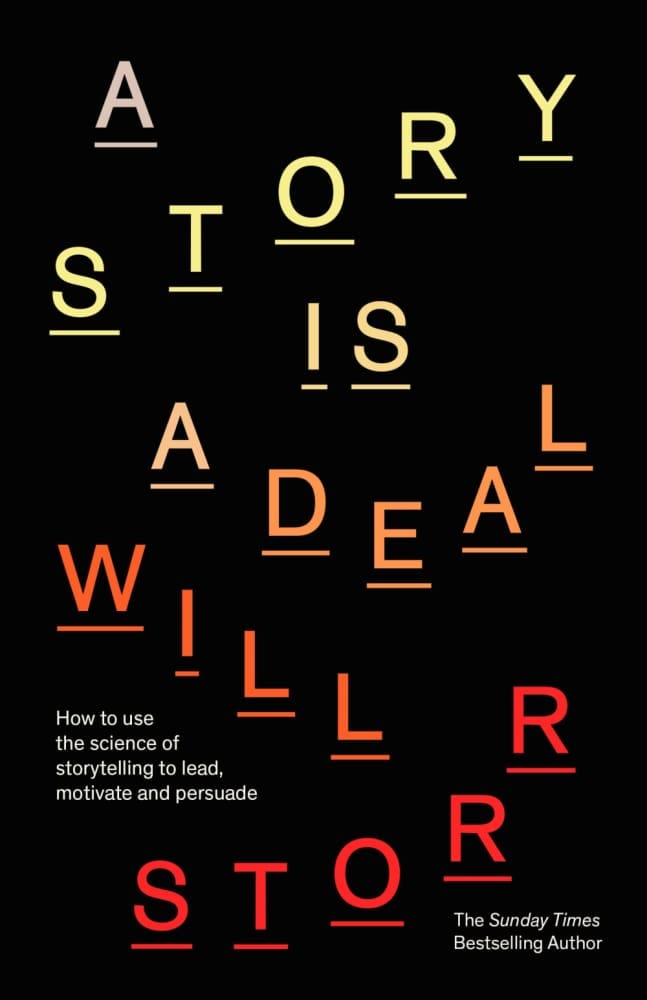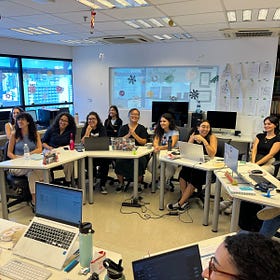How stories help us gain status and power: Interview + book giveaway with Will Storr
Issue 163: Our identities are characters we play. An interview with Will Storr of You are a Story.
Homo sapiens don’t just love stories, we live inside them. Our alternative nomenclature is homo narrans, meaning, “the storytelling animal” which centers how important and capable humans are at telling stories about ourselves and our world. Will Storr invites readers to explore the power of stories and identities in his new book, A Story is a Deal: How to use the science of storytelling to lead, motivate and persuade.
Will is an award-winning author and journalist known for his human rights reporting in The Guardian, The Sunday Times, The New York Times, and The New Yorker. His investigations into sexual violence against men earned him the Amnesty International Award and the One World Press Award. He also received the AIB Award for Best Investigative Documentary for his BBC radio series.
Known for his investigations into the human condition, Will builds on his previous bestsellers Selfie and The Status Game (he was one of the very first authors we interviewed on this newsletter here) to argue that if we want to persuade, inspire, or lead, we must tell stories that make “deals” with identity—stories that promise connection and status. In his interview, Will reflects on why A Story is a Deal matters now more than ever—in the workplace, education, politics and beyond.
“A breakthrough for me came with the understanding that, actually, connection is really about cooperation. We seek to connect to 'people like us' - characters who our brains detect are potentially useful collaborators in the trials of life.” —Will Storr
You can learn more about A Story is a Deal and order the book here. We are also giving away 10 copies of A Story is a Deal to our subscribers! To enter the giveaway,
Make sure you are subscribed to “The Power of Us” and Will’s newsletter “You are a Story”.
Restack/share this post on Substack Notes or hit share on posts that we posted about this giveaway on our Twitter/X, LinkedIn, and Instagram.
Must be a resident of the UK, Mainland Europe, Republic of Ireland, Australia, New Zealand, India, South Africa, United States or Canada. (Due to shipping and customs restrictions)
Enter before April 29th, 11:59 pm PST. Winners will be selected at random on April 30th!
What does your book teach us about social identity or group dynamics?
A Story is a Deal is an exploration of how we can tell stories about identity to lead, influence and persuade. I argue that humans, uniquely, live in an imagined story-world. Assuming we are psychologically healthy, we are the active protagonists at the centre of the story of our lives, surrounded by a cast of characters (heroes, teachers, allies, villains), and pursuing meaningful goals, which are the plots of our lives. Our 'identity' is the character we play in the story-world.
We are obsessively interested in the condition of our identity in the story-world. But how do we assess how we're doing? Like characters in fiction, we seek both connection (with groups and loved ones) and status. Understanding that we live in a story-world, and all need the social resources of connection and status is a deeply important insight for leaders and persuaders. If we can tell stories that offer these resources, we can motivate and influence other people, often profoundly. I argue that the most effective way to persuade is to tell stories that make 'deals' with our identity.
What is the most important idea readers will learn from your book?
One of the biggest insights concerns our need for individual status. I argue that, ironically, both the Communists and the Capitalists made the same fundamental mistake about status. They believed that 'group status' would be enough to give people motivation and a sense of meaning.
For the Communists, a person should be happy working only for the revolution, and not be interested in personal status. But Capitalists have also fallen into this trap. From the early days of the Industrial Revolution to modern companies such as the famously 'cult-like' WeWork, there's been a widespread belief that a good employee should just vanish into the group, and that their identity as a loyal member of the team should be enough to motivate them. (Capitalists did also believe that people were strongly motivated by money, but this only turns out to be true in the short term).
In reality, happy and motivated team members do identify with their groups, and take their groups' status wins and personal wins – but they also need a sense of individual status within the group. We need to have our personal skills and contributions recognised, and feel 'seen'.
Why did you write this book and how did writing it change you?
My previous book, The Status Game, focussed solely on status, and was a deep investigation into the many ways our need for this social resource influences life, society, history, economy, and so on.
In this book, I wanted to add the other essential ingredient, which is connection. A breakthrough for me came with the understanding that, actually, connection is really about cooperation. We seek to connect to 'people like us' - characters who our brains detect are potentially useful collaborators in the trials of life.
It changed me by opening my eyes to the huge importance of identity to humans - how people will often choose identity over their actual lives. I write about experiences of 'identity stress', in which our connection and/or status feels somehow threatened. This has been a powerful concept, for me, and had helped me understand myself better.
What will readers find provocative or controversial about your book?
Perhaps readers will find controversy in my argument that we are all somewhat helplessly seeking 'people like us' with whom to cooperate. This has a dark side, of course, in its manifestation as xenophobia. But I think we need to accept that it's a part of human nature to feel drawn to people who are 'like us' in some important way.
The good news is that 'like us' doesn't necessarily mean people with the same skin colour, sexual identity, and so on. There's plenty of research that suggests these kind of identity markers are actually very shallow, and what's more important to us is that a person shares our values, for example, or is a cooperative and useful member of our group.
Do you have any examples of practical applications of your ideas?
People are motivated by connection and status, much more than they are by money.
We want to feel like heroes in the story-world. It's impossible to overstate how important our identity is to us, so stories that appeal to identity - that tell us how to become more heroic - are incredibly effective. People still don't understand this.
During the last US election, Donald Trump told a story that promised status, and that was highly effective. Over here in the UK, the first months of the Labour government have been disastrous, and part of this is because they are doing the opposite of Trump: they are telling a story about Britain that removes status, and makes us feel diminished and hopeless. Their storytelling is dreadful, and they are suffering as a result. In contrast, the last-but-one Labour Prime Minister was a brilliant storyteller, and told stories that offered national connection and status that lead to a historic victory in 1997.
News and Updates
Jay is speaking at an in-person conference at New York University, hosted by the NYU Langone Department of Population Health. This conference focuses on translating research into action to improve urban population health and advance health equity.
We hope to see you on Monday May 5, 2025 from 9:00–2:30 ET in New York City. We will also livestream the event.
You can register for free here.
Catch up on the last one…
Last week, we featured a book club visit with the National Institute of Social and Affective Neuroscience lab in Brazil! If you would like us to visit your class or book club, read on to learn how:
Insights from "The Power of Us" Book Club
One of our greatest joys is learning about new communities that are using our book to teach a class, change an organization, design a new project, or simply discuss as part of a book club. Last month, Jay visited the Book Club of the National Institute of Social and Affective Neuroscience







